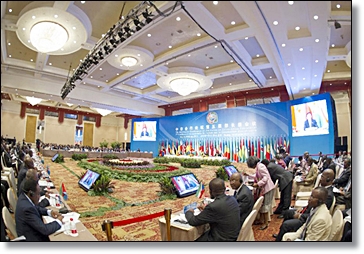Why China Will Not Solve Africa’s Problems
 |
|
A section of participants in the Fifth Ministerial Conference of the Forum on China-Africa Cooperation (FOCAC) in Beijing. Photo courtesy |
While it’s up to individual African countries to choose economic partners from the current large pool, it is wrong to assume that a particular partner will somehow solve Africa’s economic and political problems.
South Africa’s president Jacob Zuma, expressing optimism in the China-Africa ties says, ‘’We are particularly pleased that in our relationship with China, we are equals and that agreements entered into are for mutual gain.’’ China thus serves as relief from Western paternalistic and uneven relationship with Africa since independence.
Africa ought to know that it really doesn’t matter who your partners are or what plans they have for you in economic development; rather it matters what plans and strategies you have for them. What China wants from Africa is quite clear: raw materials to feed its economic boom. And its strategy? More loans and aid for Africa to lure more countries to look eastwards.
What is not clear is Africa’s strategy. Africa’s 54 countries, with a combined economy over four times smaller than China’s, are probably too small to succeed in the modern economic competition and globalization. They need to further integrate and present themselves as one economic entity. With continuing strong economic growth, an integrated Africa will make a more attractive investment destination for foreign capital and technology than a collection of tiny individual economies. Also, integration comes with increased clout and bargaining power.
Economic development is a result of wealth creation and value addition to natural resources - not who your partners are! As long as plans and strategies of individual African economies do not reflect this realization, stronger nations will continue to acquire Africa’s natural resources at bargain rates. As Africa’s economic prospects brighten, she should not allow herself to become a proxy battleground for a shifting balance of power in the world’s larger economies.
The only difference between China and the West as partners for Africa’s economic development is the absence in the Chinese mind of an Africa associated with poverty, wars and disease - ghosts still present in Western imagination - despite Africa harboring six of the world’s ten fastest growing economies and a young population which can turn things around, if properly harnessed.
While Chinese President Hu Jintao’s observation that “China sincerely supports African countries as they pursue their own development paths, and will sincerely assist African countries in strengthening their ability to develop independently’’ should not be doubted, actions speak much louder than words. Africa is no stranger to eloquent commitments that are not followed by appropriate action.
It is not China’s business to pledge assisting Africa to develop independently. A commitment to develop independently should be the goal of individual African country governments. The irony is that China still faces the same governance issues that loom over Africa’s long term success. Also, let’s face it; no country’s motives are so pure that it only wishes others to ‘sincerely’ develop independently without consideration of self-interest.
China is not in Africa to make free lunches for anyone - it’s none of its business anyway. On the contrary, Africa has been giving free lunches to many, through the provision of unprocessed crude raw materials for quite some time. It is folly to assume that Africa can negotiate mutually beneficial deals with the China when she has not resolved the issues that led to the exploitation of her resources by other partners.
Africa must not be too Westwards or Eastwards minded- but rather Inwards minded. It is within Africa that all the answers lie. Creating transparent institutions, investing in human capital, fostering a conducive environment that allows for wealth creation and value addition to resources should be Africa’s main focus. In these areas too, no help is needed, especially from China. As an East African saying goes “outside help always comes after the rain.’’
By Obadias Ndaba.
The author is regular commentator on African affairs. These are his own views
